Events
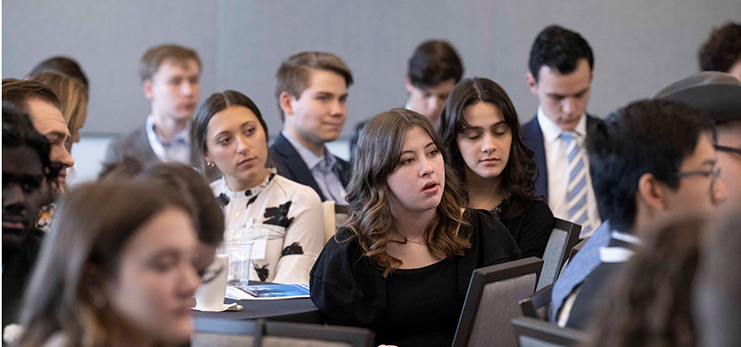
A Statistical Framework and the Problem of Disengaged Survey Responders
January 17 at 12:30 pm in Batts Hall 5.108
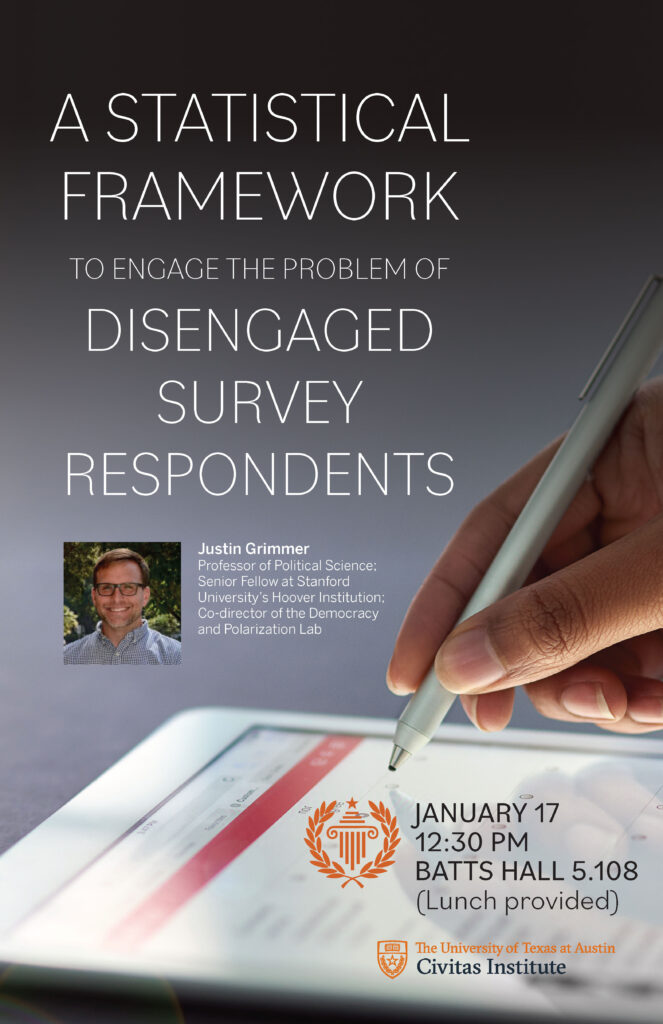
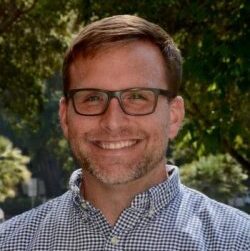
Researchers in academia, government, and industry increasingly rely upon online surveys to measure public opinion and to assess the effect of interventions because of their lower cost than over the phone and in-person surveys. But with their lower cost online surveys increase the risk of bias from disengaged respondents–a bias that remains even after firms and researchers use well-developed filters to capture disengaged respondents. We introduce and apply a statistical framework to show that the standard practice of dropping respondents who fail an attention check implicitly changes the population studied—from the overall population to the population who pass the attention checks. Using our framework we introduce a set of assumptions sufficient to partially and point identify the overall population’s attitudes and treatment effects from surveys polluted by disengaged respondents. We show how our assumptions can be applied to flexibly estimate average opinion and treatment effects, extending popular causal inference tools such as Double Machine Learning. We demonstrate our framework and proposed estimators to estimate support in the population for political violence after an election and the extent of polarization in the public.
Lunch will be provided.
Please RSVP at: https://bit.ly/GrimmerLecture
Bio: Justin Grimmer is a Professor of Political Science and a Senior Fellow at the Hoover Institution at Stanford University. He co-directs with the Democracy and Polarization Lab. His work examines how representation occurs in American democracy and methods to improve its practice, while also developing and using new statistical and machine learning tools. Along with Molly Roberts and Brandon Stewart he is the author of the recently released book “Text as Data: A New
Real World ECON: Economic Lessons for Living Your Best Life (EEFL)
January 19 5:00 – 7:00 pm Eastwoods Room in the Union
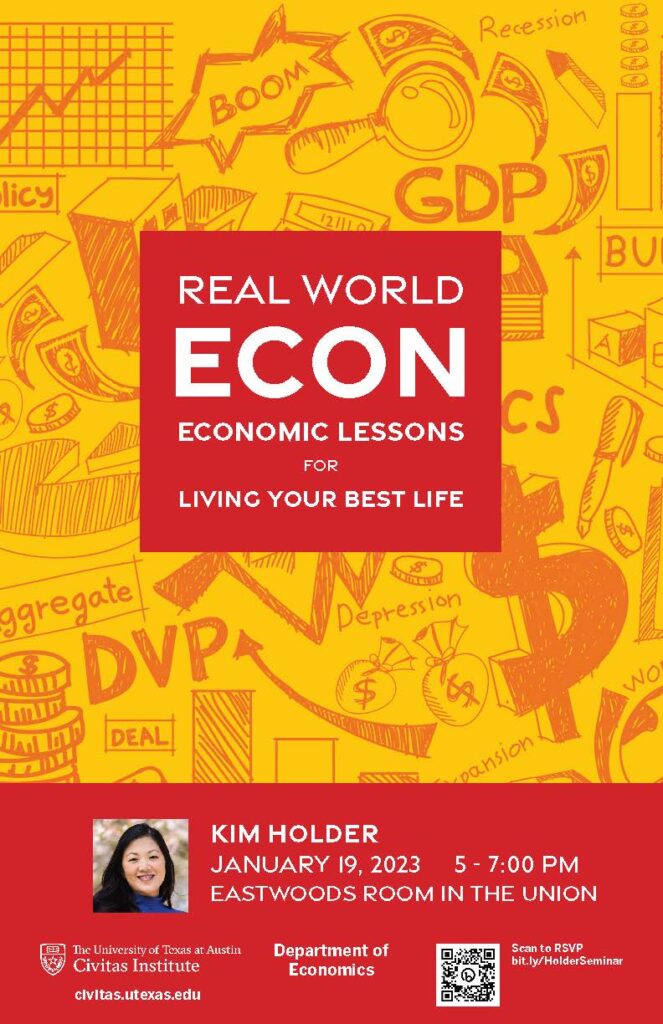
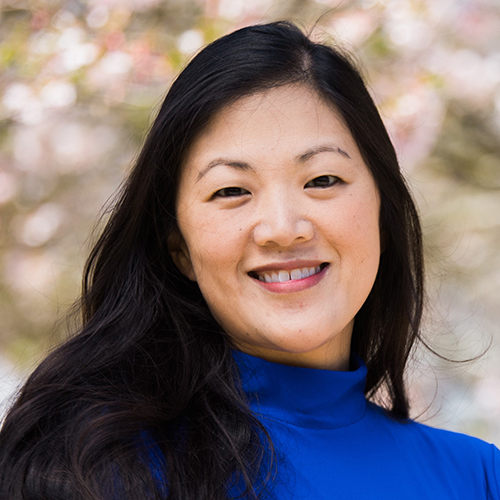
In this Distinguished Economic Educator session at The University of Texas at Austin, we will learn about the principles of economics that form the foundation of the economic way of thinking for you and your students. Relevant, real-world examples and popular culture vignettes will help us visualize and understand key concepts and bring economics and personal finance to life. By the end of this workshop, you will begin to discover some of the fun and interesting ways that economics is at work in the world that surrounds you and how understanding these ideas is beneficial to future economic and financial outcomes.
Co-sponsored with the Department of Economics at UT
Refreshments will be served
Please RSVP at: bit.ly/HolderSeminar
Kim Holder is the Director of the University of West Georgia’s Center for Economic Education and Financial Literacy and Senior Lecturer of Economics at the University of West Georgia’s Richards College of Business. She teaches undergraduate courses in economics and personal finance, serves as a faculty research mentor for students, and facilitates regional, state, national, and international outreach to K-16 students, teachers, and their surrounding communities. Holder has published over 20 articles, books, and curricula on creative economics education tools and techniques to broaden the reach of economics to diverse audiences, serves on a number of professional boards in economics, and previously served as President of the National Association of Economics Educators.
Justice Scalia was Right and Justice Alito was Wrong
Why the First Amendment Does Not Provide Exemptions from Religiously Burdensome Laws
January 26 at 12:00 pm in the Francis Auditorium
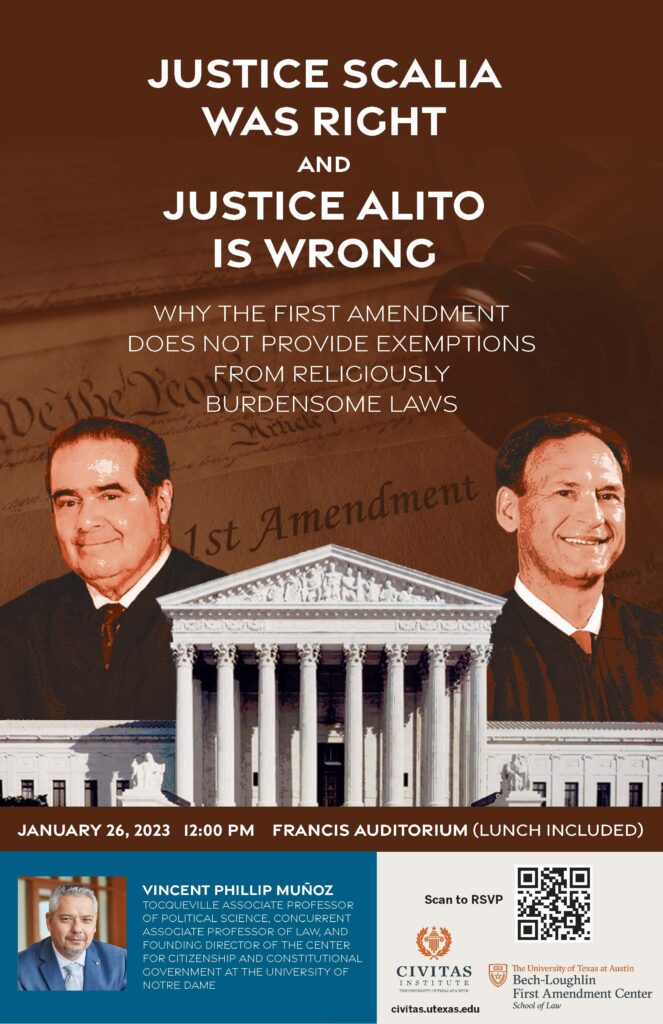
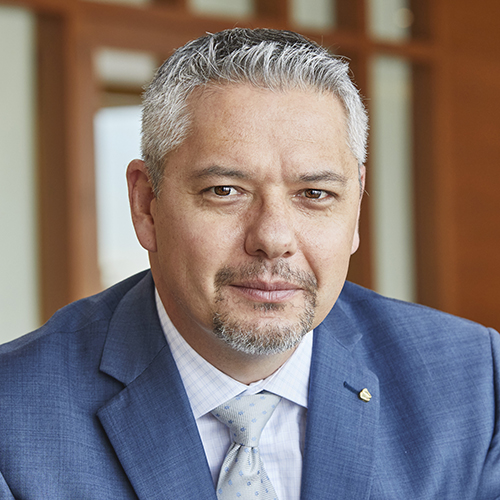
In Fulton v. City of Philadelphia (2021), Justice Samuel Alito called for the Supreme Court to overturn Employment Division of Oregon v. Smith (1990), one of its leading religious liberty precedents. Smith held that the First Amendment’s Free Exercise Clause does not provide religious individuals and institutions a right to exemptions from burdensome laws. The Smith decision has been widely criticized by scholars and jurists for eviscerating the Constitution’s protection of religious liberty. Led by Justice Alito, the Court now seems poised to overturn Smith. But does religious liberty mean religious citizens need not follow otherwise valid laws?
In his public lecture, University of Notre Dame Professor Vincent Phillip Muñoz – whose scholarship has been cited in multiple Supreme Court opinions, including by Justice Alito in Fulton and by Chief Justice Roberts and Justice Thomas in Espinoza v. Montana (2020) – will address this question and others, advancing his controversial and counter-intuitive thesis that the Founders’ understanding of religious liberty does not include a right to religious exemptions. Drawing on his new book, Religious Liberty and the American Founding, Professor Muñoz will argue that Justice Scalia was (mostly) right and, accordingly, Justice Alito’s call for overturning Smith is mistaken, at least if the Founding Fathers are to guide First Amendment religious liberty jurisprudence.
This event is co-sponsored by the Bech-Loughlin First Amendment Center
Lunch will be provided. Please RSVP at https://bit.ly/MunozLunchTalk
Vincent Phillip Muñoz is the Tocqueville Associate Professor of Political Science, Concurrent Associate Professor of Law, and Founding Director of the Center for Citizenship & Constitutional Government at the University of Notre Dame. Dr. Muñoz writes and teaches across the fields of constitutional law, American politics, and political philosophy with a focus on religious liberty and the American Founding. An award-winning teacher and a popular lecturer, Dr. Muñoz has spoken at nearly 75 colleges and universities in the past several years. He received his B.A. at Claremont McKenna College, his M.A. at Boston College, and his Ph.D. at Claremont Graduate School.
The Cost of Money: Inflation or Deflation
February 3 from 1:00 to 3:00 pm in Crum Auditorium, Rowling Hall

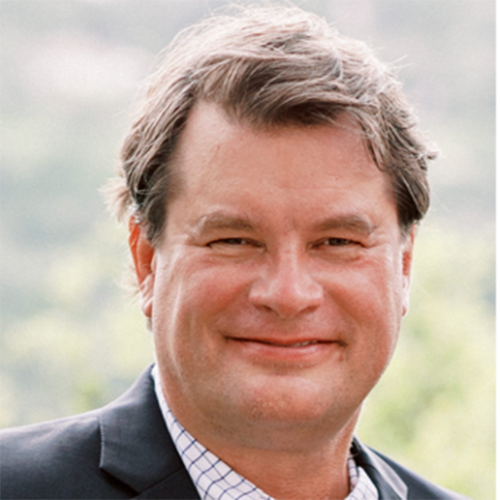
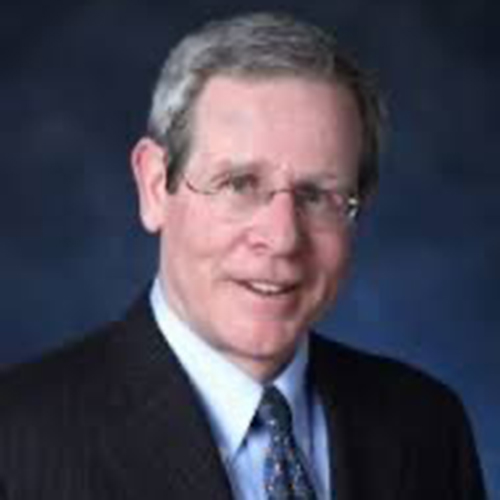
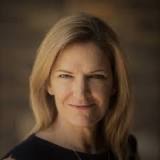
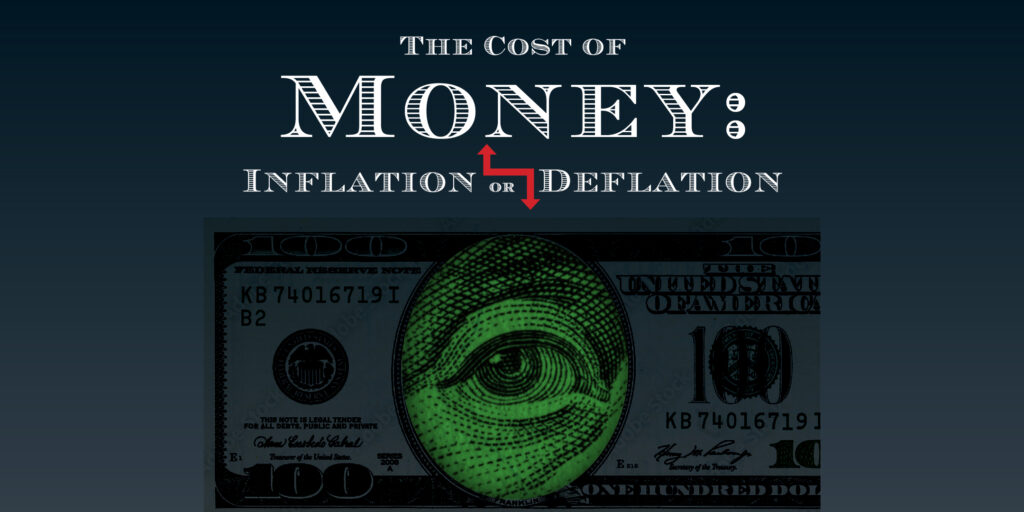
What is the cost of money? Why does it matter? Simply put, the inflation and the interest rate paid to borrow money, whether for consumption or investment, is the one of the most powerful levers for influencing our lives. It’s impact flows through all aspects of public policy, economic performance and business decision making. For the past 40 years, economic globalization, technological gains and central bank policy have all worked together to lower the “Cost of Money”. This lower cost of capital increased capital investment and raised equity values globally while also allowing governments to finance sustained spending programs at ever lower interest rates. Now, as many of these forces are receding, what does the prospect of a higher cost of capital mean for business, government, and the economy?
Dr. Lacy Hunt is a nationally renowned economist and fixed income investor who has managed bond portfolios through more than 50 years of market action.
Paul Rogge, formerly partner and senior portfolio manager at AIM funds, is a highly ranked international equity investor whose experience spans over three decades of bull and bear markets.
Doug Cliggott, a top ranked global strategist having spent 40 years covering global bond and equity markets at Merrill Lynch, JP Morgan, and Credit Suisse, teaches political economy at Amherst.
Dr. Julia Coronado, associate professor of Economics at the University of Texas, has served as a Federal Reserve Economist, strategist at BNP Paribas, and senior economist at Barclays in a 25 year career spanning academics, policy making and Wall Street.
Coffee and snacks will be provided
Co-sponsored by:
Please RSVP at: bit.ly/InflationSeminar
Ayn Rand & C.S. Lewis on the Specter of Totalitarianism: A Conversation with Yaron Brook and Micah Watson
November 30 at 6:00 pm in the Thompson Event Center (1.110)
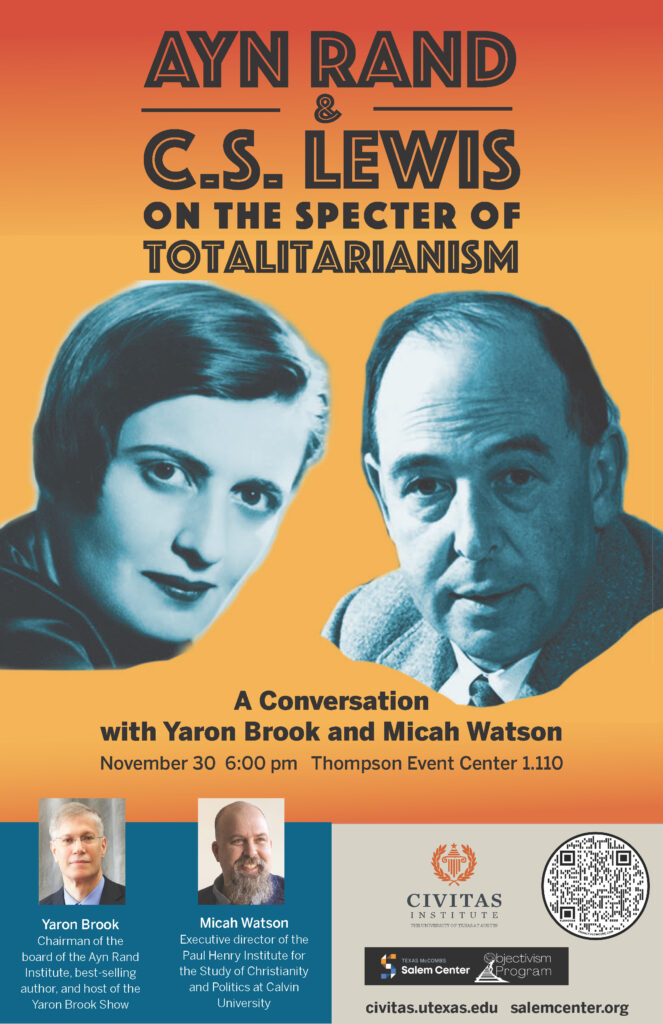
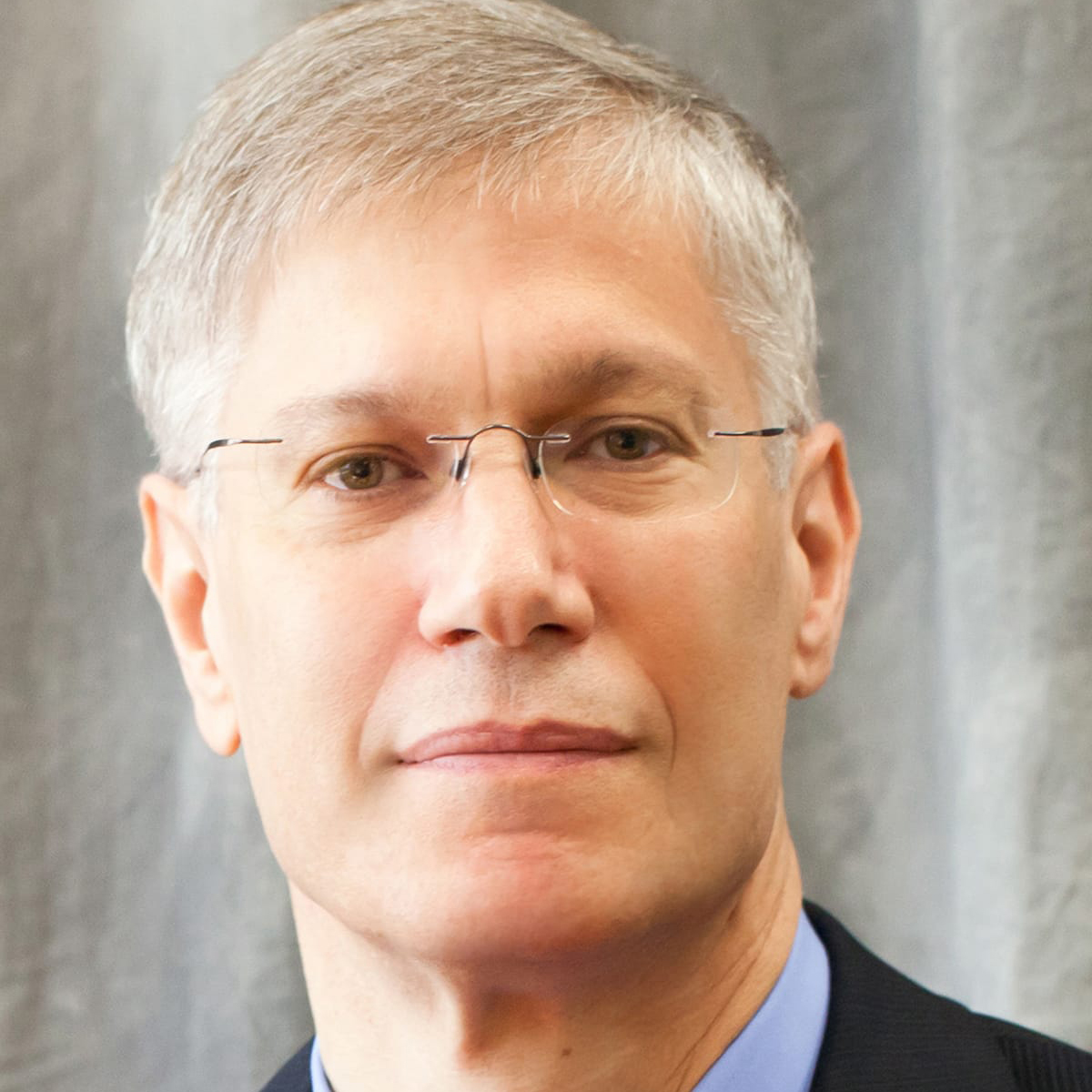
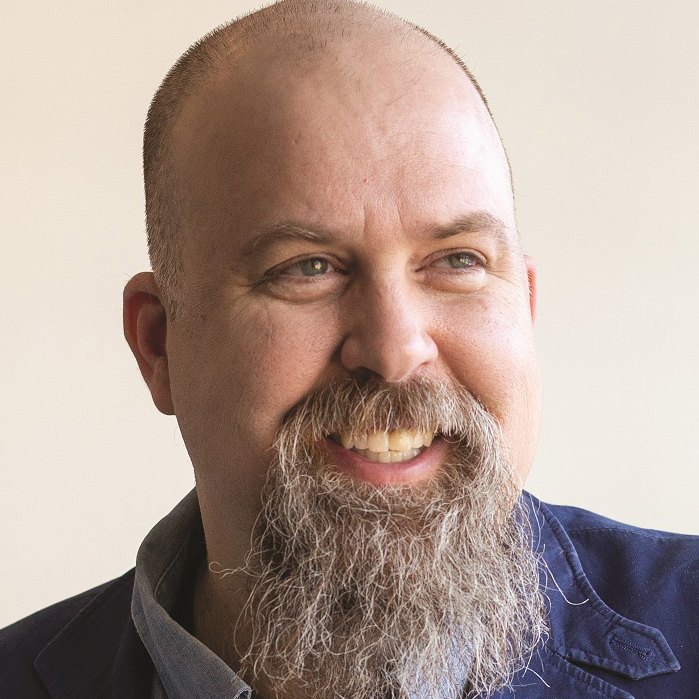
Ayn Rand and C.S. Lewis were two of the most consequential thinkers of the twentieth century. A Russian-born American novelist and philosopher, Rand founded the philosophical school of Objectivism and sold tens of millions of copies of her novels extolling free enterprise, individual rights, and private property. Lewis, an Irish-born Anglican writer and Oxford don, made a significant mark across multiple genres as he sought to reclaim a classical understanding of human nature and its implied moral limits on collective power. Each abhorred the twentieth century turn to totalitarianism, but each offered a different diagnosis of and prescription for the ills of modern political and economic life. Join us for a conversation with Yaron Brook and Micah Watson on Rand, Lewis, and the specter of totalitarianism.
This event is co-sponsored by the Salem Center for Policy.
Yaron Brook is chairman of the board of the Ayn Rand Institute, best-selling author, and host of the Yaron Brook Show. His most recent book (with Don Watkins) is In Pursuit of Wealth: The Moral Case for Finance. He holds a PhD in Finance from The University of Texas at Austin.
Micah Watson is executive director of the Paul Henry Institute for the Study of Christianity and Politics at Calvin University. He is the author (with Justin Dyer) of C.S. Lewis on Politics and the Natural Law. He holds a PhD in Politics from Princeton University.
Walter Russell Mead on American Foreign Policy
Foreign policy, the threats and crises we currently face, and the importance of good policymakers.
November 10 at 10:00 am in the Texas Student Union (Eastwoods Room)
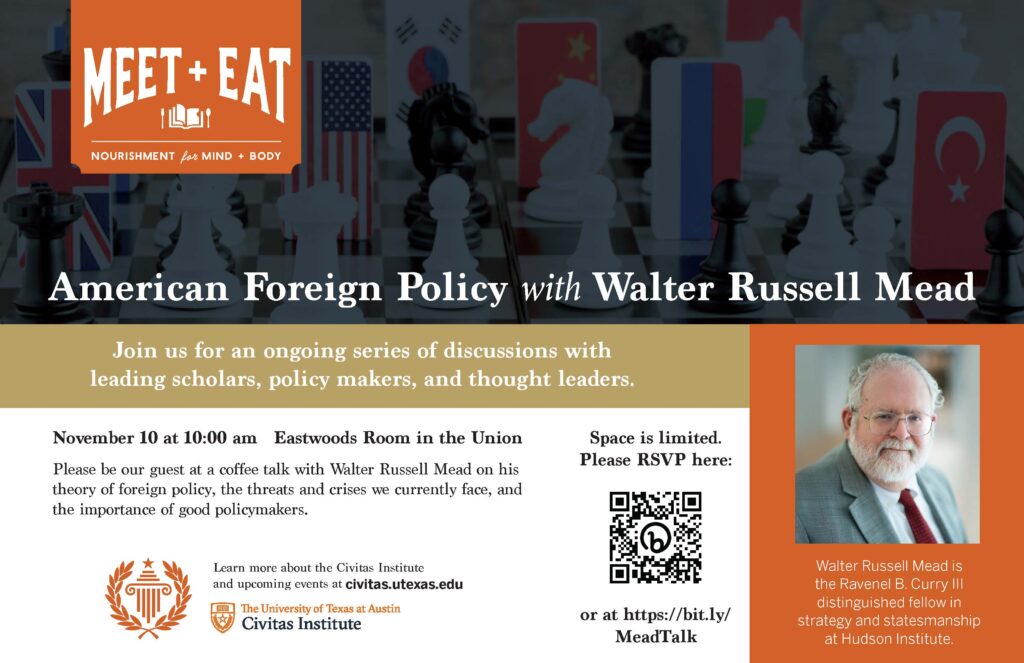
Walter Russell Mead is the Ravenel B. Curry III distinguished fellow in strategy and statesmanship at Hudson Institute, the James Clarke Chace professor of foreign affairs and humanities at Bard College, and the “Global View” columnist at the Wall Street Journal. From 1997 to 2010, Mr. Mead was a fellow at the Council on Foreign Relations, serving as the Henry A. Kissinger senior fellow for US foreign policy from 2003 until his departure. He is a member of Aspen Institute Italy.
His book, Special Providence: American Foreign Policy and How It Changed the World (Alfred A. Knopf, 2004), was widely hailed by reviewers, historians, and diplomats as an important study that will change the way Americans and others think about American foreign policy. Among several honors and prizes, Special Providence received the Lionel Gelber Award for best book in English on international relations in 2002. In 2012, the Foreign Policy Research Institute awarded him its Benjamin Franklin Prize for his work in the field of American foreign policy.
Mr. Mead’s book, God and Gold: Britain, America and the Making of the Modern World (Alfred A. Knopf, 2007), is a major study of 400 years of conflict between Anglophone powers and rivals ranging from absolute monarchies like Spain and France through Communist and Fascist enemies in the twentieth century to al-Qaeda today. The Washington Post and the Economist listed it as one of the best books of the year.
His most recent book, The Arc of A Covenant: The United States, Israel, and the Fate of the Jewish People (Alfred A. Knopf, 2022), is a bold history of the US-Israel relationship that examines the origins of American support for Israel and the relationship’s impact on past, present and future US policy. Mr. Mead discusses, among other things, the forgotten history of left-wing support for Zionism, the foundation of the state of Israel, the myth of the “Israel lobby” and the rise of the Sunbelt coalition in US politics.
Mr. Mead writes on a wide variety of subjects ranging from international affairs to religion, politics, culture, education and the media. He has contributed to a wide variety of leading American journals ranging from Mother Jones to GQ and frequently appears on national and international radio and television programs.
Mr. Mead is an honors graduate of Groton and Yale, where he received prizes for history, debate, and his translation of New Testament Greek. He has traveled widely in the Middle East, Asia, Europe, Africa, and Latin America, and often speaks at conferences in the United States and abroad. He is a founding board member of New America, and also serves on the board of Aspenia. He is a native of South Carolina and lives in Washington, DC.
Braver Angels – UT-Austin Debate
Should social media companies suppress disruptive voices?
November 9 at 6:00 pm at the AT&T Hotel & Conference Center, Room 201
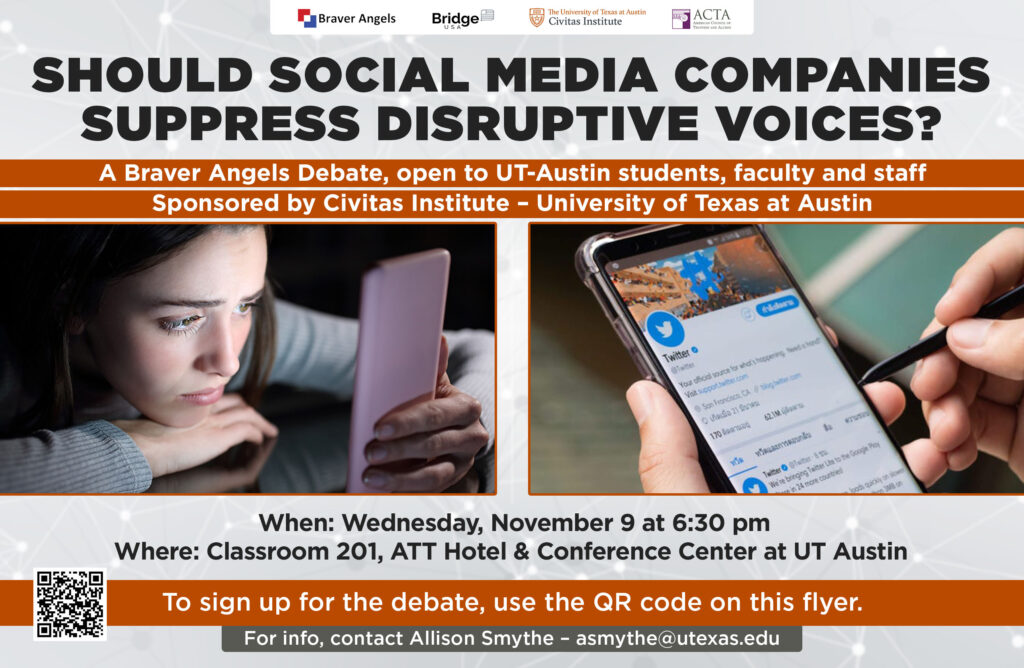
University of Texas at Austin students, faculty, and staff are invited to join a respectful conversation touching all sides of a challenging issue. Braver Angels debates are not competitive, but a provide a deep experience of civil discourse. Conducted in a light parliamentary style, they teach students to engage with each other respectfully around difficult, polarizing issues. Students think together, listen carefully, and allow themselves to be touched and even changed by each other’s ideas. Participants emerge with greater empathy and appreciation for diversity of thought.
Sponsored by Civitas Institute, this collegiate debate is free and brought to you with the support of a partnership of Braver Angels, BridgeUSA, and the American Council of Trustees and Alumni (ACTA), non-profit organizations that believe in the power of free expression and respectful exchange of ideas on America’s college campuses.
Questions? Contact Allison Smythe — asmythe@utexas.edu
Registration for this debate will be open until the scheduled starting time of 6:30 PM Central Time on Wednesday, November 9.
To learn more about Braver Angels collegiate debates, you can view this video of a sample debate (2 minutes). If you are new to our debates, this two-minute video will help you get started. This file might help you understand the debate process that we use.
We’ll see you there!
The Enduring Core of American Foreign Policy: Montesquieu and the Right of Nations
October 18 at 12:15 pm in the Texas Student Union (Eastwoods Room)
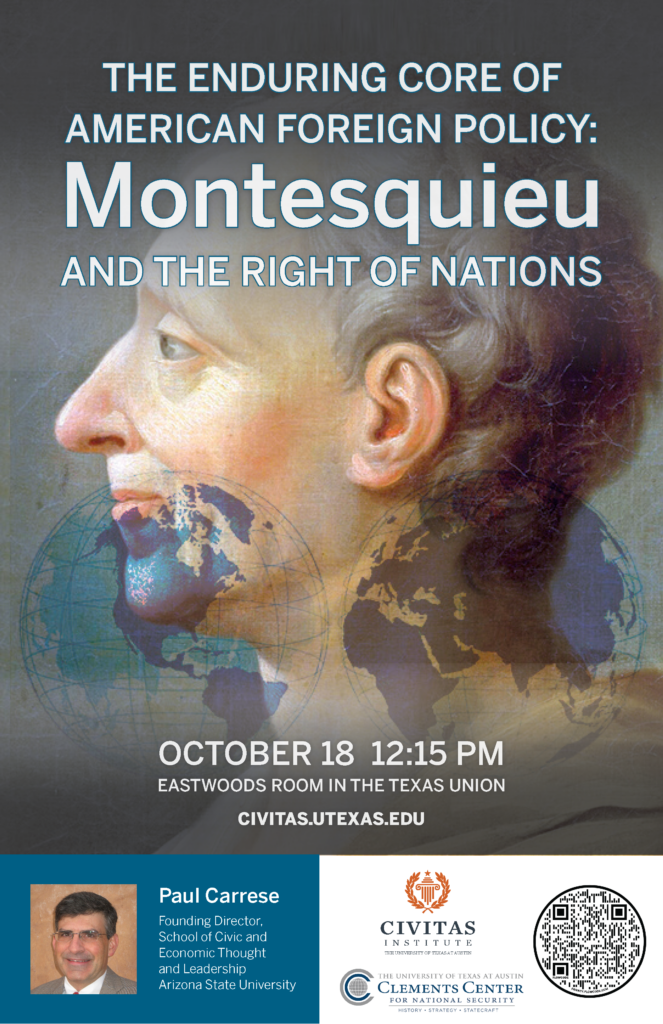
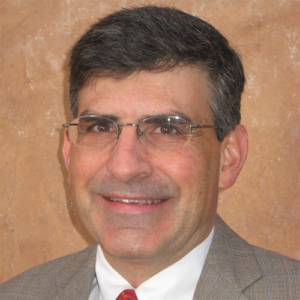
Academic and policy debates about American foreign policy in the post-Cold War era turned away from the core principles that had informed American views of war, justice, and peace since the founding. Rival camps today look either to a modern school of realism (traceable to Machiavelli and Hobbes) or to a modern school of liberal idealism (traceable to Kant). From Washington and Lincoln to the Roosevelts, Eisenhower, and Reagan, however, the dynamic core of successful American foreign policies instead sought to balance sobriety about international affairs with an exceptional commitment to universal principles prioritizing peace and stability. The foundation informing this core is Montesquieu’s philosophy of the right of nations, encapsulated as a principle of enlightened self-interest among moderate states. Join us for this noon-hour talk as Professor Paul Carrese draws from Montesquieu to uncover the core foreign policy principles that informed the theory and practice of American grand strategy from the founding through the Cold War.
Paul Carrese is the founding director of the School of Civic and Economic Thought and Leadership at Arizona State University and is Nonresidential Fellow of the Civitas Institute at The University of Texas at Austin. For nearly two decades he was a professor at the U.S. Air Force Academy, where he co-founded a new honors program blending liberal arts education and leadership education. His most recent book is Democracy in Moderation: Montesquieu, Tocqueville, and Sustainable Liberalism.
This event is co-sponsored by the Clements Center for National Security.
Coffee Talk with Jennifer Doleac and Ryan Streeter
October 17 at 9:00 am in the Texas Student Union (Eastwoods Room)
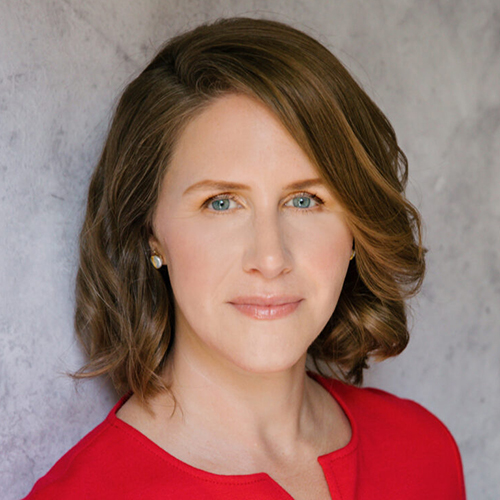
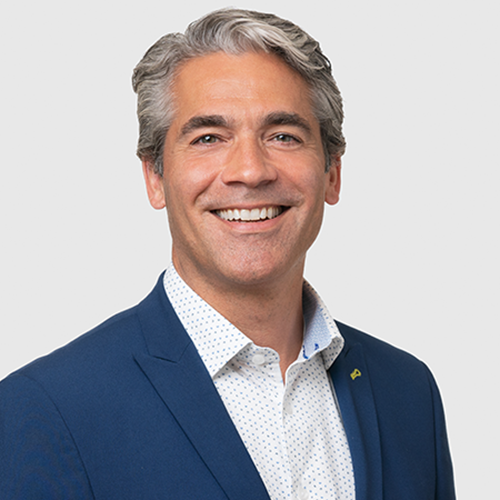
Join us for a conversation with Jennifer Doleac, Associate Professor of Economics at Texas A&M University, and Ryan Streeter, Director of Domestic Policy at the American Enterprise Institute, as we discuss their respective career paths and ongoing projects. This event is geared toward graduate students in the social sciences but is open to enterprising undergraduate students as well.
RSVP at https://bit.ly/DoleacStreeter
Jennifer Doleac is Associate Professor of Economics at Texas A&M University, Research Fellow at the Institute for Labor Economics, and Senior Fellow at the Niskanen Center. She is an accomplished scholar and public intellectual whose work focuses on the economics of crime and discrimination. She holds a Ph.D. in economics from Stanford University.
Ryan Streeter is the State Farm James Q. Wilson Scholar and director of domestic policy studies at the American Enterprise Institute, where he oversees research in education, technology, housing, poverty studies, workforce development, and public opinion. He holds a Ph.D. in philosophy from Emory University.
